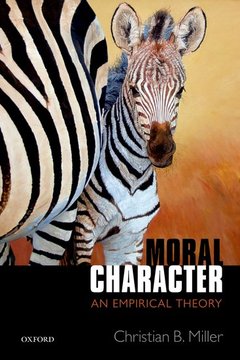Description
Moral Character
An Empirical Theory
Author: Miller Christian B.
Language: English
Subject for Moral Character:
Publication date: 05-2015
368 p. · 15.2x23.1 cm · Paperback
368 p. · 15.2x23.1 cm · Paperback
Description
/li>Biography
/li>
Christian Miller presents a new account of moral character. Most of our friends, colleagues, and even family members are not virtuous people. They do not have virtues such as compassion, honesty, or courage. But at the same time, they are not vicious people either. They do not have vices such as cruelty, dishonesty, or cowardice. Instead most people today have characters which do not qualify as either virtuous or vicious. They have many positive moral features, but also many negative ones too. Our characters are decidedly mixed, and are much more complex than we might have thought. On the one hand, many of us would kill an innocent person in a matter of minutes under pressure from an authority figure as part of a psychology study. Or we would pretend to not see someone collapse from an apparent heart attack across the street. Or we would make a wide circle around someone's dropped papers rather than stop to help pick them up. Yet it is also true that many of us would help another person when we are by ourselves and hear sounds of a non-ambiguous emergency in the next room. Or we would come to the aid of a friend when feeling empathy for her need, and do so for altruistic rather than egoistic reasons. In Moral Character: An Empirical Theory Miller outlines a new picture of our moral character which involves what are called Mixed Character Traits. This picture can help make sense of how most of us are less than virtuous people but also morally better than the vicious.
Christian Miller is Associate Professor of Philosophy at Wake Forest University. His main areas of research are meta-ethics, moral psychology, moral character, action theory, and philosophy of religion. He is also the author of Character and Moral Psychology (OUP forthcoming), and the editor of The Continuum Companion to Ethics (Continuum 2011) and Essays in the Philosophy of Religion (OUP 2006). His work has appeared in such journals as Noûs, Philosophy and Phenomenological Research, Philosophical Studies, Philosophical Psychology, The Journal of Ethics, Journal of Ethics and Social Philosophy, and Oxford Studies in Philosophy of Religion. He is the director of The Character Project (www.thecharacterproject.com), which is funded by the John Templeton Foundation.
© 2024 LAVOISIER S.A.S.

